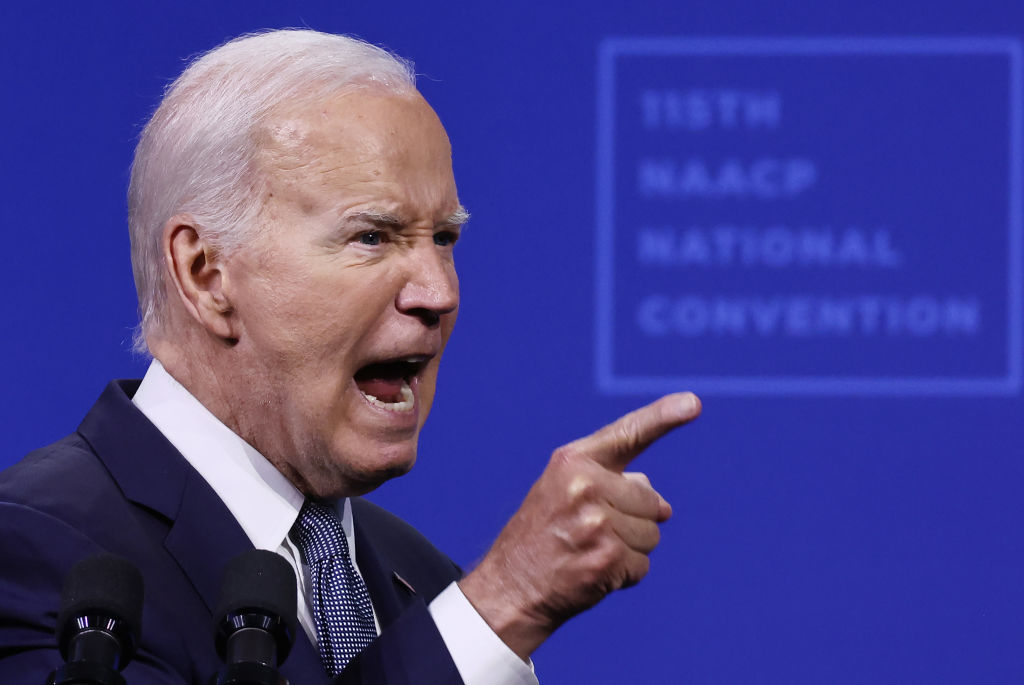A dangerous madman is up for election.
Democratic Civil War

The three heads of the Democrat Hydra will soon start biting at each other.
Donald Trump may still sit in the White House, but America seems increasingly submissive to the rule of the Democrats. The Party now enjoys predominant influence over mainstream media, rising influence among wealthy elites, a stranglehold over education and entertainment industries, and the domination of the burgeoning non-profit world. Remarkably the self-styled “party of the people” now accommodates the big Wall Street firms and tech oligarchies alongside the progressive, neo-socialist, activist base and an ever-diminishing remnant of traditional working-class voters.
This powerful coalition is also a fundamentally unstable one—a three-headed hydra whose heads, particularly after Trump leaves, will soon be biting each other furiously. One faction, the corporatist elite, genuflects and even profits from the progressive mantra on climate, gender, and race. Some, like former Twitter CEO Dick Costolo, are so committed to gentry progressivism that he recently suggested those who don’t get with the program could “face a firing squad.” Others, like the Marxists and rioters of BLM, seek a total social revolution and increasingly speak of ending “racial capitalism.”
Many on the Right, having learned nothing since Reagan, simple-mindedly identify each of these two dominant groups as “liberal.” A more accurate assessment would be “corporatist” and “socialist.” Largely left: the constituency that once drove the Democratic Party—middle-of-the-road voters, many of them in unions, who constitute roughly half of party members. Only 15% of Democrats consider themselves “very liberal.” Along with older African-American voters, these suburban voters, also mostly older, were critical to nominating the lackluster former vice president. They could very well get him into the White House itself.
The Corporatists
The tech oligarchs and their Wall Street allies were clear winners of the Democratic primaries. The so-called “party of the people,” Biden and other Democrats now can count the wealthiest individuals on the planet among its ranks, including former Microsoft CEO Steve Ballmer, Facebook co-founder Dustin Moskowitz, Zynga’s Mark Pincus, Steve Jobs’s widow Lauren, as well as media moguls Michael Bloomberg and Barry Diller.
This pattern, already notable in 2016, can also be seen in 41 of the 50 wealthiest Congressional districts that Democrats now represent. It is now wealthy donors who dominate the party, not the grassroots youth movement agitated by Sanders. This point bears repeating over and over again. This is particularly true in the key battle for the Senate, where most Republicans find themselves overwhelmed by a torrent of oligarchic wealth.
Some oligarchs, such as Jeff Bezos with his mouthpiece the Washington Post, are following along not out of enthusiasm, but at least partially out of naked fear of socialists like Bernie Sanders and Elizabeth Warren. But it’s doubtful even an unhinged San Francisco billionaire like Costolo has much interest in having his wealth and market power disrupted by radicals, who feel, justifiably in my mind, the largely unrestrained oligarchs, and their Wall Street allies, devour far too much of the nation’s wealth and should have much of their property confiscated by the state. After all, both Sanders and his acolyte Alexandria Ocasio-Cortez believe that billionaires “should not exist.”
Once their favored candidates, notably Kamala Harris, stalled in the garage, the monied classes joined the party establishment’s Biden caravan. They were fairly happy to fund a successor to Obama, whose presidency completely embraced the consolidation and power of the oligarchs; many Obama veterans have spread over Silicon Valley in high, and often well-paid positions. In the new administration, expect Harris, with close ties to firms like Facebook, big corporate, and Hollywood elites, to be the moguls’ chief advocate. If Biden fades, or is forced to resign due to cognitive decline, her accession would consolidate the triumph of the genteel, leftist, and increasingly concentrated tech oligarchy, rescuing them both from rude Trumpian tweets and any attempt by the grassroots progressives to limit their hegemony.
The Progressive Left
Throughout the early primaries, Joe Biden was a poor performer, consistently running behind progressive firebrands Sanders and Warren. In Texas, 73% of voters under 30, and half of all Latinos—key groups shaping the future Democratic electorate—backed Sanders or Warren. The leftist duo trounced Biden by 2 to 1 among Hispanics and almost 7 to 1 among younger voters. Similarly in California, the two progressives won 57% of the Latino vote, almost three times that of Biden, who barely got 5% of voters under 30. (Sanders and Warren won roughly 70% between them.)
Biden’s willingness this summer to adopt many positions embraced by Sanders, and recent wins by leftist candidates over more conventional liberals, might convince some progressives the wind is at their backs. This may be true within the Democratic Party, on campuses, and among hipster urbanites. But once you look beyond this constituency, far-left progressive positions, particularly on social issues, are not widely popular with older voters, independents, and moderates. According to one recent survey, upwards of 80% of all voters (including minorities) identify political correctness not as a solution but as a problem.
This pattern extends into key issues for the woke. The vast majority of citizens, including African Americans, want to either increase the number of more police in their neighborhoods, or keep it the same. Some 80% of people, reports Rasmussen, oppose federal control of zoning, a key progressive demand. And most are also skeptical of the costs associated with the Green New Deal. Biden, showing some savvy, has backed away from many of these positions, at least until the election. His meal ticket is not the Left’s actual program but the manifest and understandable abhorrence of Donald Trump in the minds of a large portion of America.
The Old Democratic Party
Biden’s biggest challenge, and that of the party overall, will be maintaining his middle-of-the-road base. This includes the increasingly beleaguered middle- and upper-working classes, including pandemic-ravaged small businesses and those they employ. White union voters, particularly in the private sector, were once tilted to the Democrats. But they had already been shifting right for decades before the Trump era. Whites and non-college-educated voters are the only large demographic groups where the president still maintains an edge. They remain key to the President’s re-election.
Some of these voters, particularly in a poor economy, may be reassured by Biden’s well-honed image as a “regular guy” and a “moderate.” Yet increasingly, the policies of the party’s two dominant factions—the corporatists and the socialist Left—are out of sync with working- and middle-class interest. On issues like climate change, patriotism, and housing, notes Berkeley law professor Alli Joseph, both the progressives and corporatists evidence “class cluelessness or class condescension” that undermines the party’s populist appeal. The Left’s agenda, as epitomized by the New York Times’s 1619 project, and widely adopted by the corporate elite, is no winner on Main Street. Even the World Socialists see it as “a gift to Donald Trump” and “a falsification of history” which denies “the great Democratic legacy of America’s revolutions” and alienates most working class Americans.
There are plenty of issues critical to the everyday needs of ordinary people—backing reindustrialization, resisting China’s predominance, and expanding access to health care—to unite the old Party, which I personally supported for most of my life. But prioritizing middle- or working-class needs may prove difficult for a party dominated by out-of-touch celebrities, academics, environmental zealots as well as corporate globalists whose instinct is to kowtow to China. The current Hong Kong protests have shown that many leading corporations—Apple, Nike, Vans, Activision, the NBA—have joined what one writer calls “the bootlickers,” acceding to Chinese demands and backing the CCP against Hong Kong.
Is There a Democratic Manifest Destiny?
Since the Obama era, Democrats have embraced what may best be described as a political version of “manifest destiny.” This thesis was best laid out in 2002 by progressive theorists Ruy Teixeira and John Judis in their influential Emerging Democratic Majority. Initially their thesis was confirmed with the Obama election, but undermined by Trump’s 2016 victory.
Both Judis and Teixeira now agree that long-term Democratic predominance, even if Biden wins, may be less guaranteed than once envisioned. They argue that the focus on cultural and green issues, as opposed to lunch-bucket concerns, has limited appeal to the middle and working class; certainly extreme environmental policies, as seen in California, clearly are hurting the poor and minority populations. Certainly, any significant attacks on oligarchical power—even anti-trust enforcement—would likely be crunched by corporatist influence.
Take the issue of energy. One can only imagine the damage to the party when, despite promises to the otherwise, Biden and his presumed heir Harris eventually find a way to “ban” fracking in places like Texas, North Dakota, Ohio, and Pennsylvania; in Texas alone, by some estimates, a million jobs would be lost. Overall, according to a U.S. Chamber of Commerce report, a full ban would cost 14 million jobs—far more than the eight million lost in the great recession.
What Happens After 2020?
Youngstown author John Russo, an expert on the working class in Ohio, in a recent article in the quasi-socialist American Prospect, suggests this year that Republicans will lose Ohio and other rustbelt states. He traces this to a sagging economy, policies more favorable to Wall Street than Main Street, and, of course, the perceived bungling of the pandemic. He also predicts a decline in evangelical support, at least among younger congregants, motivated by understandable revulsion to our very un-Christ-like President.
Yet over time, Russo suggests, the Biden Administration cannot both serve its corporate hosts and address “the resentment” of both working-class whites and minorities. He warns that if Biden follows a corporatist agenda, the progressives will not stay silent for long. “Progressives shut up early because Trump is so terrible,” he explains. But when the hated Trump departs (if not next year, then in 2024), he will cease to exert the adhesive influence currently tying the socialists, whose activist numbers are swelling, together with the likes of Jeff Bezos.
This chasm with working people could be made worse if, as Biden has suggested, lockdowns are extended and even toughened until even the hint of danger has passed. Some progressives, like California’s Gavin Newsom, see in the pandemic—which has turned the state’s metropolitan areas as among the worst-performing in terms of jobs in the nation—not as an economic emergency but “an opportunity for reimagining a progressive era as it pertains to capitalism.” Some environmentalists hail the lockdowns as a potential model for addressing climate change. Although kinder to the upper classes, the lockdowns have been most devastating to small businesses, minorities and the poor. These supposed Democratic constituencies might resent a policy agenda imposed from above that threatens to undermine their livelihoods, turning them from aspiring members of the middle class into permanent serfs.
Caught between the woke Left and their corporate hegemons, the critical traditional Democrats will likely remain in flux, perhaps turning to the right if Democratic policies—such as the Green New Deal, opening prisons, de-funding cops, and allowing federal control of zoning—actually become national policy. Perhaps only after the increasingly toxic Trump is off the ballot, and out of cyberspace, these often misled and angry voters will be up for grabs. But regardless of the results of this November’s election, whoever can appeal to them can dominate American politics for the foreseeable future.
The American Mind presents a range of perspectives. Views are writers’ own and do not necessarily represent those of The Claremont Institute.
The American Mind is a publication of the Claremont Institute, a non-profit 501(c)(3) organization, dedicated to restoring the principles of the American Founding to their rightful, preeminent authority in our national life. Interested in supporting our work? Gifts to the Claremont Institute are tax-deductible.
The president needs to resign from office posthaste.
Party insiders destroy the process in order to save it.
Whether Biden was once upon a time a good man or trustworthy, he no longer is.
Will the Democrats give up power if they lose?
It’s time to take the fight to the Left.






